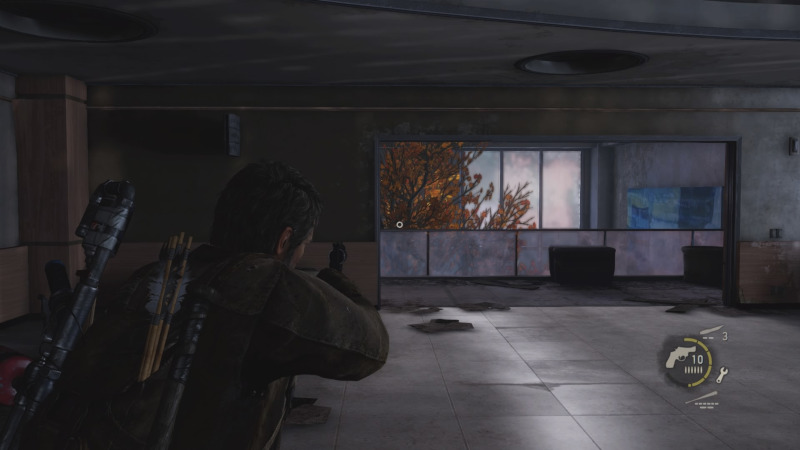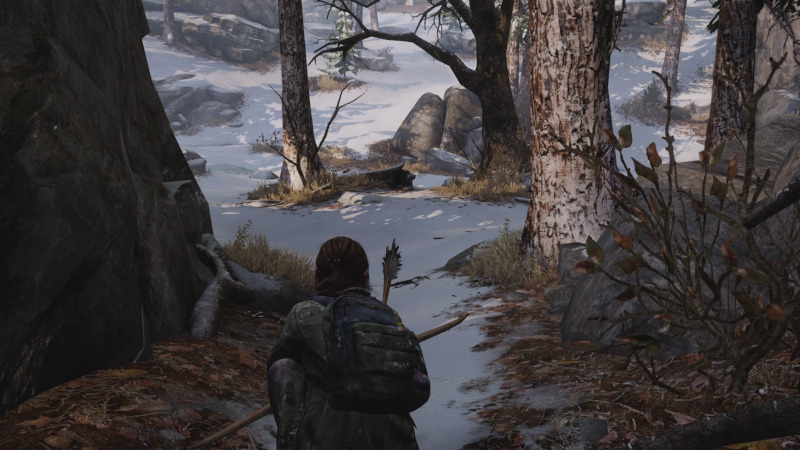I’m a little behind the game, so to speak. Up until a few weeks ago, I had never played through The Last of Us. I know, I know. It’s one of the best games to have come out in the past 10 years. It achieved new levels of emotional storytelling and yadda yadda yadda. I just never played it. When it came out, I had just gotten married, so playing a post-apocalyptic game wasn’t high on my priority list. And when the remastered version came out a year later, I didn’t have a Playstation 4, so that was a no-go. In between that time and now, I’ve not only purchased a Playstation 4, but I also ended up with a copy of the remastered version as well.
A few weeks ago, as I was looking for something spooky to play for October, I popped it in to give it a shot. It, uh, didn’t grab me right off the bat, so I didn’t finish it then. However, I knew that with as much as people talked about it, there must be something there, so once my spooky gaming month was over, I decided to go back and power through it. If this game was truly as great as everyone said, I wanted to experience it, especially with its sequel set to release next year
So, I did it. Over the course of about a couple of weeks, I dipped my toes back into The Last of Us a little each night. As of a few days before writing this, the credits have rolled. Now, that’s where things have gone a little awry. I didn’t like it. Judging by the Internet’s response to the game, I think I may be one of only a handful of people that feel this way. So, let’s go. Here’s a hot take nearly seven years in the making.
The Last of Us is an extremely well-produced and well-written video game, but underneath the shine, I hated how it made me feel.
On Violent Cynicism

On first blush, it may seem like I’m trying to do the typical Internet thing of shitting on a popular game. But, I’m really not. I’m not attempting to write anything subversive or contrarian at all. Simply put, when all was said and done, The Last of Us left a really bad taste in my mouth, and the taste is so bad, it makes me question whether I even want to play the sequel.
Please note: I am going to talk about the ending of the game quite a bit, so spoilers ahoy. You have been warned.
I think my biggest issue with the game has very little to do with the actual events of the game itself. As I said earlier, I think the story is extremely well done. The characters are well-acted, and the dialogue is solid, and ultimately, the actual narrative is very emotional and engaging. I have no issues with any of the cutscenes, levels, or gameplay. It all works really, really well, and I have no complaints. On the surface, anyway. As I started to peel away the layers, though, I’m left with a violent cynicism within the game itself, and that’s where I start to take some issue.
So, what do I mean by a violent cynicism? Well, at its essence, the world of TLOU is one that has fully embraced the most extreme forms of social Darwinism. Class systems within the game have formed based on strength, and consistent displays of that strength are required to keep lower classes in subjugation. Might makes right, essentially. We see this in both the interactions between the military and the populace, as well as how the Fireflies take on the guise of a militaristic operation, complete with high levels of weaponry. Characters like Bill and David rely on power structures within their respective worlds to maintain something resembling order, and when anything threatens to overturn that order, their defense is to grow more violent in response. But even all of that is pretty standard fare for post-apocalyptic fiction.
Where The Last of Us sets itself apart is that this extreme take on violence and power is not only required to thrive in this world but necessary to survive. Joel understands this, and he has long since accepted it. Tommy doesn’t want to believe it, but he’s confronted by it every time his town is attacked. And Ellie doesn’t believe it in the beginning, but slowly learns the truth as the game progresses. This is not a game where rational moral centrality exists. There are only two extremes between moral and immoral, and the moral side of the spectrum has long since died out. There is only immorality here, and if a person doesn’t accept that and actively engage in it, they will not survive long.
In addition to this, and this is very, very important: the game not only invokes this violent cynicism but also fosters it by destroying any sense of hope within the world as well. From the beginning of the game, we are given a glimpse of hope for not only Joel but the world itself through the character of Ellie. We are conditioned to allow the darkest parts of humanity to build through the characters in the game because we are moving toward the light, we believe we are helping save the world, or at the very least, saving Joel.
Of course, anyone who has played the game knows that this isn’t entirely the case. When the epilogue comes, we’re left wondering exactly what we’ve spent the past 15 hours fighting for. Joel is still an asshole, and the world is no closer to a cure than it was before the game started. Well, it might be even farther away, since Joel has massacred most of the remaining Fireflies.
On Literary Naturalism

Now, all of this isn’t a bad concept for a story. There is a long history of great fiction that focuses on immorality within the world and the human response to it. In many ways, The Last of Us is more akin to naturalistic fiction from the late 19th century than any of its contemporary video games. Literary Naturalism is a philosophical movement driven by the idea that we are products of our environment, and all of our decisions are essentially predestined by the environment we live in.
The world of The Last of Us is one of violence and savagery, so all of the characters who are in that environment take on that same violence and savagery as an inherent trait. All of their decisions are informed and shaped by this. This is especially clear in the decision that Joel makes at the end of the game. It is a decision rooted in selfishness. He comes from a world in which selfishness is a requirement to survive.
I think why I didn’t enjoy the game so much is that this game not only forces its characters to live in this world but also the player itself. The narrative is so engaging that you want to see the game through to its conclusion. But, if you want to see the rest of it, you have to be willing to become as savage as the world is, especially on harder difficulties. Ammunition is scarce, so if you want any hope of progression, you have to fight dirty. You need to hit people in the face with bricks and shove their noses into countertops. You have to tape scissors to the end of your baseball bat, so you can kill more quickly and more efficiently. And you, the player, has to make the decision to do that.
This isn’t like other naturalistic works, like McTeague by Frank Norris, Sister Carrie by Theodore Dreiser, or even the movie Chinatown. All of those works present similar worlds of blanket immorality and characters who make horrible decisions based solely on the environments in which they find themselves, but as a reader or viewer, you are a passive participant. In The Last of Us, you have to actively participate. Either that or shut the game off and never play again. Those are your two choices.
And honestly, I don’t know that I want to participate in that. I mentioned three works in the paragraph above, and I picked those three because I truly love them. But, again, I love them as a passive participant. The Last of Us is different. I can appreciate the story that the game wants to tell without wanting to actively participate in it. And I think that’s ultimately where I’ve landed.
With the sequel coming out next May, I don’t think I’ll play it. I am interested in where the characters go from here, so I will probably watch someone else play it. But, I think I’m okay not shoving any more faces into countertops or slicing the throats of any more innocent doctors. Ultimately, I think I’m okay, never living within that world again.



![[NEWS] ‘PSYCH: THE MOVIE 2’ COMING LATE 2019](https://geekd-out.com/wp-content/uploads/2019/06/Psych_16x9_FeaturedPromo_2560x1440-150x150.png)
One thought on “[OPINION] THE LAST OF US IS AN ENGAGING STORY, BUT I HATE IT”